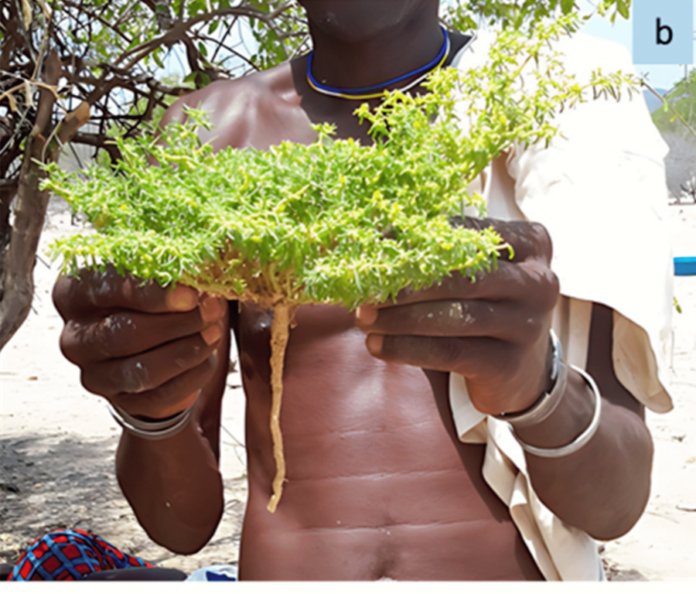A recent study by Plaatjie, et al. (2024) titled “A scoping review on efficacy and safety of medicinal plants used for the treatment of diarrhea in sub-Saharan Africa” published in Tropical Medicine and Health, by Springer Link, shows that Indigofera daleoides and Punica granatum showed the strongest antimicrobial activity.
“
Indigofera daleoides and Punica granatum exhibit strong antimicrobial activity, offering potential as effective anti-diarrheal treatments.– Plaatjie, et al. 2024
This article is a scoping review that explores the efficacy and safety of medicinal plants used to treat diarrhea in sub-Saharan Africa (SSA). Diarrhea remains a leading cause of illness and death in SSA, particularly due to the prevalence of antimicrobial-resistant pathogens, which complicates treatment. The review systematically maps the existing literature on various medicinal plants traditionally employed in the region for their anti-diarrheal properties. By assessing the potential of these plants, the review aims to identify natural remedies that could provide effective and safe alternatives to conventional treatments, especially in the face of rising antibiotic resistance.
How the Study was Conducted
The authors searched for studies published between 1990 and April 2022. The search included various databases to ensure comprehensive coverage. The review included different types of studies, such as ethnobotanical studies: These document traditional knowledge and use of medicinal plants. In vitro studies: laboratory experiments testing the plants’ effects on pathogens. In vivo studies: experiments conducted on living organisms to observe the plants’ effects. Observational studies analyze data from a population at a specific point in time. The authors extracted data on the plant species, their families, and their reported anti-diarrheal efficacy and safety. The study analyzed the data to identify the most commonly used and effective plants, as well as the geographical distribution of the studies.
What the Authors Found
The review identified 587 plant species from 123 families, primarily from South Africa, Ethiopia, and Uganda, with the Fabaceae family being the most studied; significant knowledge gaps exist in under-researched countries, and six anti-diarrheal compounds were isolated from Hydnora johannis, highlighting the need for further documentation and phytochemical analysis. In addition, the study also found that Indigofera daleoides and Punica granatum showed the strongest antimicrobial activity.
Why is this Important
Health Impact: Diarrhea is a major cause of illness and death in sub-Saharan Africa, especially among children. Finding effective treatments can significantly reduce morbidity and mortality rates.
Antimicrobial Resistance: Many pathogens causing diarrhea are becoming resistant to conventional antibiotics. Medicinal plants offer alternative treatments that could help combat this resistance.
Traditional Knowledge: The study documents traditional medicinal knowledge, which is valuable for preserving cultural heritage and providing insights into natural remedies that have been used for generations.
Research Gaps: By identifying gaps in current research, the study highlights areas that need more attention, such as underresearched regions and the need for phytochemical investigations. This can guide future research efforts and funding.
Potential for New Drugs: The identification of plants with strong anti-diarrheal properties opens the door for developing new, plant-based drugs that could be more accessible and affordable for people in sub-Saharan Africa.
What the Authors Recommended
- The study emphasized the need to document traditional medicinal knowledge from less-studied countries in sub-Saharan Africa. This can help preserve valuable cultural heritage and provide a broader understanding of medicinal plant use.
- The authors recommended conducting more phytochemical investigations on widely used medicinal plants. This can help identify active compounds and understand their mechanisms of action, potentially leading to the development of new drugs.
- The authors highlighted the importance of focusing future research efforts on regions that have received less attention. This can help fill knowledge gaps and ensure a more comprehensive understanding of medicinal plant use across the entire region.
- The authors suggested conducting more studies on the safety and efficacy of these medicinal plants to ensure they are safe for use and effective in treating diarrhea.
In conclusion, the scoping review by Plaatjie et al. underscores the significant potential of medicinal plants like Indigofera daleoides and Punica granatum in combating diarrhea, particularly in the context of rising antimicrobial resistance in sub-Saharan Africa. By highlighting both the efficacy and safety of these plants, the study not only preserves invaluable traditional knowledge but also paves the way for future research and the development of accessible, plant-based therapies. Continued exploration and documentation of these natural remedies are crucial for addressing health challenges in the region and beyond.
















 The African Research (AR) Index is a comprehensive scholarly directory and database focused explicitly on journal publishers that publish and disseminate African research.
The African Research (AR) Index is a comprehensive scholarly directory and database focused explicitly on journal publishers that publish and disseminate African research.

